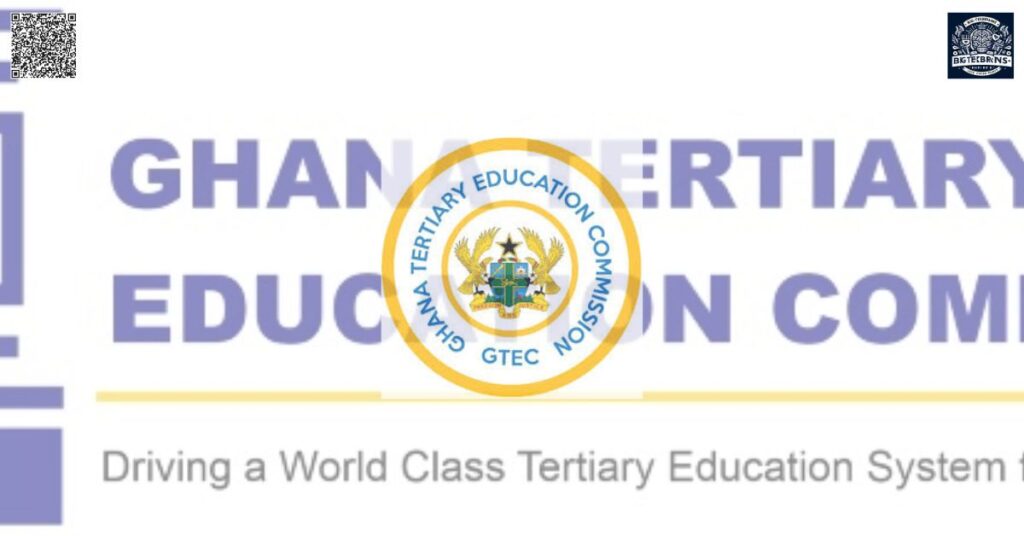Excerpt
The Ghana Tertiary Education Commission (GTEC) serves as the regulatory authority overseeing tertiary education in Ghana. Established under the Education Regulatory Bodies Act, 2020 (Act 1023), GTEC emerged from the merger of the National Council for Tertiary Education (NCTE) and the National Accreditation Board (NAB). This consolidation aims to enhance the efficiency and effectiveness of tertiary education regulation in the country.
Historical Background
Ghana’s journey in regulating tertiary education began in 1962 with the formation of the National Council for Higher Education, responsible for policy matters concerning universities and related institutions. Following governmental changes in 1966, the Council was dissolved, and its functions were transferred to the Higher Education Division of the Ministry of Education. In 1972, the National Council for Higher Education was reinstated to advise on university education development but was again abolished in 1982, with its duties assigned to the PNDC Secretary for Education and Culture. The NCTE was subsequently established in 1993 under Act 454 to oversee tertiary institutions’ administration. Parallelly, the NAB was created to accredit both public and private tertiary institutions. The enactment of Act 1023 in 2020 unified these bodies, leading to the establishment of GTEC.
Constitutional Mandate
GTEC’s primary mandate is to regulate tertiary education in all its forms to promote:
- Efficient and effective administration and accreditation of tertiary institutions.
- Consistent quality of service across institutions.
- Advancement and application of knowledge through teaching, research, and collaboration with industry and the public sector.
- Development of appropriate human capital for sustainable national economic advancement.
Organizational Structure
GTEC operates under the Ministry of Education and is governed by a board appointed by the President of Ghana. The Commission is led by a Director-General, supported by a Deputy Director-General. Various directorates within GTEC handle specific functions, including accreditation, quality assurance, research, and institutional support.
Leadership and Ranks
The leadership hierarchy of GTEC comprises:
Director-General:
- Oversees the overall operations and strategic direction of the Commission.
Deputy Director-General:
- Assists the Director-General and may oversee specific departments or initiatives.
Directors of Directorates:
- Lead various specialized units within the Commission.
Appointments to these positions are typically made by the government, following established public service recruitment procedures.
Mode of Appointment or Recruitment
Appointments within GTEC are conducted in accordance with public service recruitment protocols. Senior positions, such as the Director-General and Deputy Director-General, are appointed by the President of Ghana, often based on recommendations from the Ministry of Education and in line with the country’s public service regulations.
Affiliated Offices and Units
GTEC collaborates with various agencies under the Ministry of Education to fulfill its mandate. Key affiliated bodies include:
Ghana Education Service (GES):
- Oversees pre-tertiary education.
Commission for Technical and Vocational Education and Training (CTVET):
- Regulates technical and vocational education.
National Schools Inspectorate Authority (NaSIA):
- Ensures quality assurance in schools.
Achievements
Since its establishment, GTEC has made significant strides, including:
Digitalization of Accreditation Processes:
- Implementing a digital system to expedite and simplify accreditation procedures for tertiary institutions.
Migration of College of Education Teachers to Tertiary Salary Structure:
- Advocating for and nearing the completion of migrating College of Education teachers to a tertiary salary structure, enhancing motivation and recognizing their contributions.
Promotion of Strong Governance in Tertiary Institutions:
- Encouraging institutions to adopt robust governance procedures to ensure quality and integrity in education delivery.
Constitutional Reforms
- The most significant constitutional reform impacting GTEC was the enactment of the Education Regulatory Bodies Act, 2020 (Act 1023). This legislation merged the NCTE and NAB to form GTEC, aiming to streamline the regulation of tertiary education and enhance the quality and relevance of higher education in Ghana.
References
- https://www.gtec.edu.gh/
- https://www.gtec.edu.gh/download/file/GTEC%20STRATEGIC%20PLAN%202023.pdf
- https://www.gtec.edu.gh/our-mandate
- https://ghanaeducation.org/how-the-new-ghana-education-service-structure-looks-like/
- https://educationghana.org/gtec-nears-completion-of-migrating-college-of-education-teachers-to-tertiary-salary-structure-ellis-ferdinand/
- https://www.ghanabusinessnews.com/2025/01/13/ghana-tertiary-institutions-urged-to-embrace-support-strong-governance-procedures/
- https://www.developmentaid.org/organizations/view/95359/gtec-ghana-tertiary-education-commission
- https://educationghana.org/mandate-of-the-ghana-tertiary-education-commission-gtec/
- https://www.gtec.edu.gh/about-us
- https://www.devex.com/organizations/ghana-tertiary-education-commission-gtec-186965
- https://www.chea.org/international-directory/ghana-tertiary-education-commission

